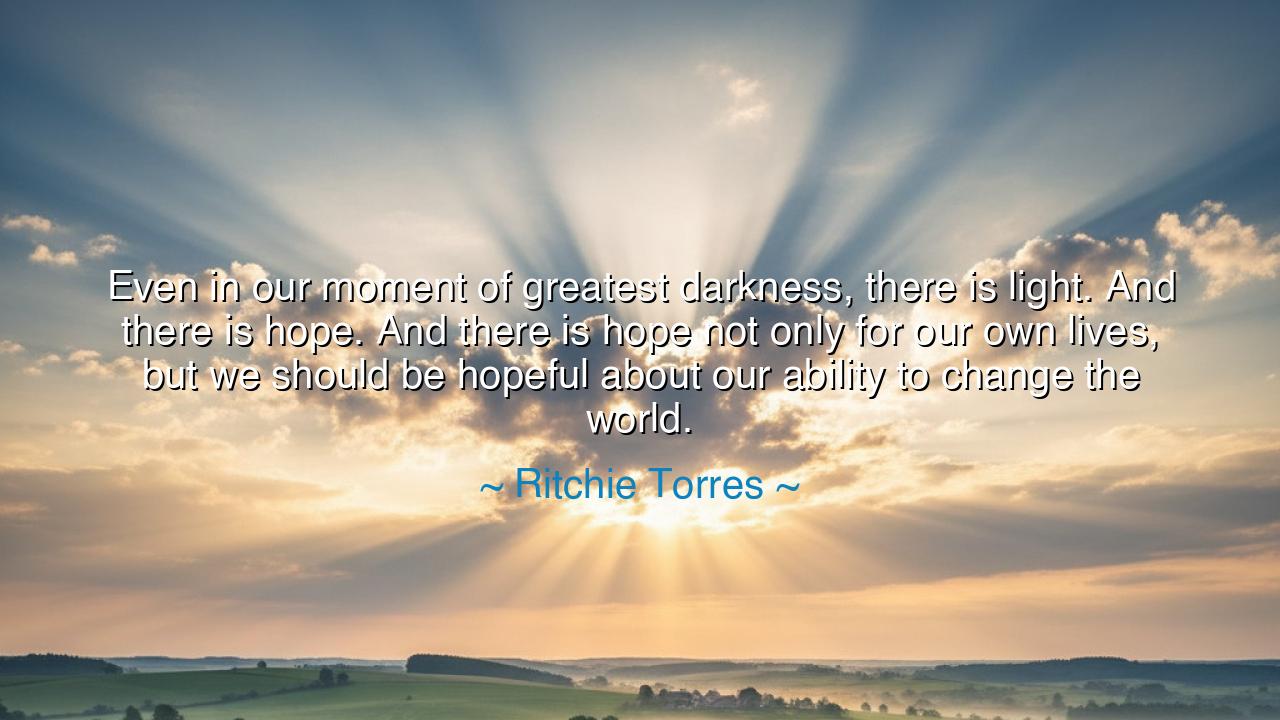
Even in our moment of greatest darkness, there is light. And
Even in our moment of greatest darkness, there is light. And there is hope. And there is hope not only for our own lives, but we should be hopeful about our ability to change the world.






“Even in our moment of greatest darkness, there is light. And there is hope. And there is hope not only for our own lives, but we should be hopeful about our ability to change the world.” So spoke Ritchie Torres, a man born of hardship yet tempered by conviction—a voice that rises from the struggle of the streets to the chambers of power. His words are not the naïve musings of comfort, but the cry of one who has walked through the shadows and emerged still believing. In these lines, we hear a truth that echoes through the ages: that light is not the absence of darkness, but the courage to see beyond it; that hope is not the denial of suffering, but the defiance of it.
To say that there is light even in darkness is to affirm that within despair itself lies the seed of renewal. Every age of man has known such nights—times when fear smothers the heart and the world seems broken beyond repair. Yet always, from the ruins, rises a spark. That spark is hope, fragile yet immortal, kindled by those who refuse to surrender. Torres reminds us that this flame is not given by fate; it is chosen. It is the act of souls who, though surrounded by darkness, still lift their gaze to the horizon and whisper, “The dawn will come.”
Consider, O listener, the story of Nelson Mandela, who spent twenty-seven years imprisoned in a cell no wider than a grave. Many men would have perished in spirit long before the body’s release. Yet Mandela did not let darkness consume him. In that narrow space, he nurtured a vision wider than the world itself—the dream of a nation reborn. When at last he walked free, he carried not bitterness, but light. Through forgiveness, he transformed not only his own fate, but the fate of millions. His life, like Torres’s words, teaches us that even when the night seems eternal, the human soul has power to summon the sun.
Yet Torres’s vision does not end with survival; it calls us to action. “We should be hopeful,” he says, “not only for our own lives, but about our ability to change the world.” Here lies the deeper flame of his teaching: that hope is not passive. It is a force that demands movement. True hope is not sitting in the ashes waiting for light to find us—it is gathering the ashes to build a torch. It is the belief that what is broken can be remade, not by divine accident, but by human will. To be hopeful is to stand in the ruins and begin to rebuild.
Throughout history, the light of hope has always found its bearers. When the plague struck Florence, Boccaccio wrote his tales not to escape reality, but to preserve the human spirit. When war raged across Europe, Anne Frank, hidden and hunted, still wrote of faith in human goodness. When the towers fell and the world trembled, ordinary people ran toward the smoke to save lives, proving that light does not come only from the heavens—it shines from the hearts of the living. The lesson is clear: the power to change the world begins not with wealth or rank, but with the courage to believe when belief seems foolish.
And yet, there is a quiet heroism in Torres’s message. For he speaks not only to nations, but to the individual soul. Each of us knows the moments of darkness—of loss, despair, loneliness, or failure. In those hours, hope may feel distant, like a faint star in a storm. But it is precisely then that we must look for it. The smallest act of kindness, the decision to keep moving forward, the resolve to rise again—these are the ways we summon light from the void. The world changes not only through great revolutions, but through countless unseen acts of hope.
So let this teaching be your lantern: never surrender to despair. Even when life weighs heavy, remember that darkness is not the end—it is the canvas upon which light reveals its strength. Let your hope not be silent or idle. Turn it into action, into compassion, into persistence. Speak for the voiceless, lift those who have fallen, and dare to believe that your choices ripple outward, shaping the destiny of the world. For when many hearts burn with hope, the night cannot last.
And thus, as Ritchie Torres reminds us, light is not somewhere far away—it is within us. When we choose to hope, we do more than survive; we illuminate. When we act on that hope, we do more than live; we transform. The world waits for such souls—the ones who, in their darkest moment, still rise to say: “There is light. There is hope. And with that hope, I will help remake the world.”






AAdministratorAdministrator
Welcome, honored guests. Please leave a comment, we will respond soon